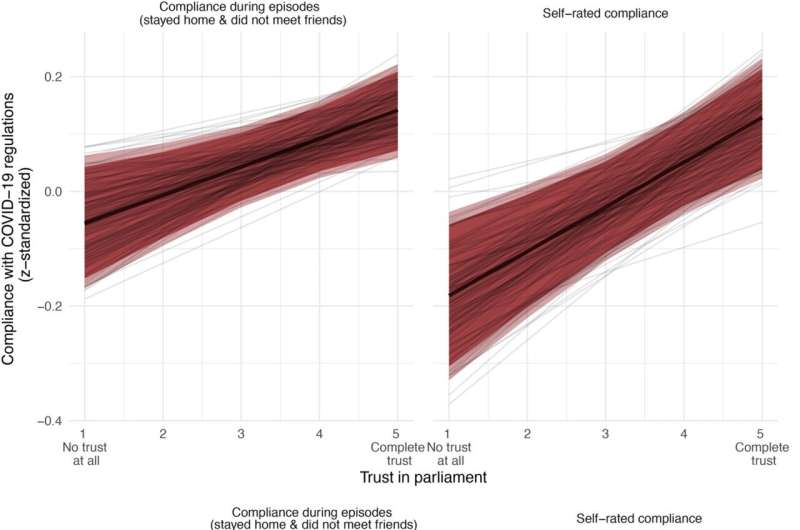This article has been reviewed according to Science X's editorial process and policies. Editors have highlighted the following attributes while ensuring the content's credibility:
fact-checked
peer-reviewed publication
trusted source
proofread
Trust hardly makes us careless and complacent in crisis situations, says study

A new study highlights the importance of mutual trust between citizens and authorities when society is facing a crisis. Moreover, data from the COVID-19 crisis indicates that general trust in our fellow citizens is unlikely to make us less compliant with restrictions.
Society is significantly better equipped to deal with crisis situations when the relationship between citizens and authorities is characterized by mutual trust and respect rather than distrust and hostility. This is confirmed by a new study using data from the first lockdown of the COVID-19 pandemic in Denmark in spring 2020.
The study shows that people with a high level of trust in government and the authorities are not only more likely to follow the authorities' instructions by their own admission. In practice, trust also helps people to comply with requirements and recommendations to stay home and avoid physical contact, as was the case during the lockdown.
Furthermore, the study shows—and this is new—that there is little reason to fear that trusting other people makes us less compliant.
For Séamus A. Power, Associate Professor at the Department of Psychology at the University of Copenhagen and lead-author of the study, this is an important finding: "In theory, trust can have both a positive and negative side during an epidemic like COVID-19. It is positive that people listen to the authorities. On the other hand, the high level of trust in other people can also be jeopardizing how you adhere to the recommendations, simply because people trust that other people would not be out mingling if they had COVID and therefore become less cautious themselves. Our survey shows that this risk may be exaggerated. In general, trust is just good," he says.
What we say and what we do
Previous studies have suggested that general trust in other people—not just trust in authority—may cause us to become less compliant during an epidemic because we have exaggerated expectations of other people's responsibility.
But because the new study takes into account both people's actual and self-assessed behavior, it can better assess how real the risk is. Indeed, the study draws on several thousand survey responses collected online during the lockdown in spring 2020, where participants were not only asked about their views on trust and the extent to which they believed they were complying with the restrictions. They also recorded their actual day-to-day activities.
The rich data confirms that people who express high levels of trust in other people are slightly less likely to comply with government requirements. But only judged on their own statements. Looking at people's actual behavior as recorded in their "diaries," the study finds no clear negative effect.
Trust with deep roots
The widespread culture of trust seen across Scandinavian countries has been the subject of both political and scholarly interest. In the new study, the researchers therefore complement the quantitative part with 21 longer interviews in which selected participants from both Danish and foreign backgrounds elaborate on their views on trust and the significance of trust during the COVID-19 pandemic.
Overall, the interviews, which will also be developed in other scientific articles, show that many perceive trust as an important part of Danish culture with deep historical, political and cultural roots. Some also point to the fact that the political system, with its low corruption and multiple parties, fundamentally represents and respects the interests of people.
According to the authors of the study, such trust-building factors contributed to the broad support for the restrictions during the COVID-19 epidemic. At the same time, the Danish experience points to the importance of developing mutual trust between governments and citizens by focusing on improving people's lives and ensuring equal, fair treatment.
Such trust-building takes time. In return, Séamus A. Power believes, society will benefit greatly: "People living in Denmark have an incredibly high level of trust in parliament, government and other people, and that was very important during the COVID pandemic. There might be some paradoxes related to trust, but on aggregate and from an overall democratic perspective, it is far better to have a trusting society than a society without trust."
The findings are published in the British Journal of Social Psychology.
More information: Séamus A. Power et al, Why trust? A mixed‐method investigation of the origins and meaning of trust during the COVID‐19 lockdown in Denmark, British Journal of Social Psychology (2023). DOI: 10.1111/bjso.12637
Journal information: British Journal of Social Psychology
Provided by University of Copenhagen





















